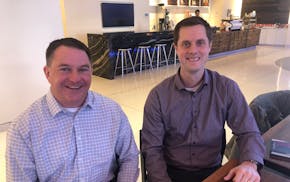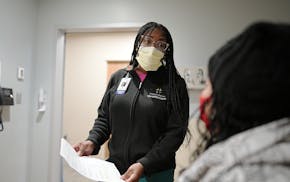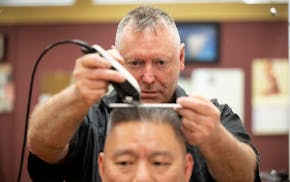Michelle "Mitch" Hedlund is a passionate advocate for the environmental and economic benefits of using more of the paper, aluminum, glass, plastic, wood and other stuff that now gets dumped or incinerated.
The CEO of Twin Cities-based Recycle Across America was talking to about 100 corporate and college managers the other day, walking them through a slide show that ranged from gloomy to uplifting. Some tidbits:
• California spends $500 million a year trying to keep litter from the ocean, much of it recyclable.
• More than 2 million plastic bottles go into a landfill every hour.
• China is starting to refuse recyclables shipped from the U.S. as raw materials for factories there, claiming the material contains too much garbage.
Recycling is the "No. 1 action society can do to simultaneously improve the environment, the economy, manufacturing" and mitigate ocean pollution and address climate change, Hedlund tells audiences and clients. But we need to redouble our efforts.
Hedlund, 52, who quit a six-figure corporate marketing career a decade ago to pursue her enviro-economic passion, is getting traction in her quest to lift recycling results.
Hedlund boasts a growing list of multistate clients, including the Minnesota State Fair, Whole Foods, U.S. Bank Stadium, Minneapolis-St. Paul International Airport, Citibank and Macalester College.
The key to boosting proper recycling is standardized labeling, more conveniently placed containers and stepped-up marketing, according to Hedlund.
In 2016, Hedlund's several-person nonprofit business, which advocates, designs and distributes hundreds of thousands of recycling labels annually to businesses, schools and government agencies, had a hand in the State Fair adding 260 recycling bins, funded largely by industry partners. That's on top of 500-plus existing bins. Signage also improved.
For the last two years, fairgoers dumped tons less food, diapers and other garbage into recycling containers for aluminum, glass, paper or plastic that is feedstock for the next generation of products. The amount recycled or composted last year increased 15 percent.
Fair management last summer recycled or composted 340 tons of material, including 155 tons of cardboard; 46 tons of glass, plastic and aluminum; 70 tons of cooking oil; and 68 tons of composted food waste. Another 1,744 tons of manure and bedding were used for fertilizer or composted.
A zero-waste stadium
Recycle Across America's tactics have made a difference at U.S. Bank Stadium. Bradley Vogel, sustainability specialist at the stadium has improved from 23 percent diversion of recyclables and waste food in its first year, 2016, to 69 percent diversion from the garbage stream so far this year.
The goal for the stadium is to get as close to a zero-waste facility as possible.
Hedlund and other recycling advocates have a credible bottom-line argument.
We pay hundreds of millions in the Twin Cities to dump waste. It makes sense to channel as much as possible into reuse and recycling markets, employ thousands of people and create more environmental and economic value through products with recycled content. Manufacturers are increasingly willing to use recycled feedstock, as corporate America embraces environmental sustainability. More and more stakeholders demand it.
And, on balance, we're making progress. Angie Timmons, supervising environmentalist with Hennepin County, said residential and commercial property owners now recycle about half of what was once considered garbage. Slightly less than a third of the total is burned for energy in the Hennepin County waste-to-energy incinerator. The rest goes to landfills.
Brent Ostrowski, procurement manager at Best Buy, and a board member of Recycle Across America, said there is a growing movement among retailers and other businesses to incorporate recycled content and green practices into the normal course of business.
"It's a viral moment," said Hedlund. "We need a 'society-wide' standardized [labeling] system. As a best practice."
Hedlund thinks her system is the most effective. She clashed with Hennepin County regulators over labeling issues and recycling approaches several years ago. She has accused pollution authorities of stealing her designs.
In 2012, Hedlund's lawyer wrote a cease-and-desist letter to county environmental officials. Although the county's lawyers disputed that there was a copyright issue, the county eventually made changes to further differentiate its labels from those used by Recycle Across America.
"Since 2012, we have distributed thousands of standardized and customized labels at no cost to our partners in an effort to make recycling easier to understand for our residents," said county spokeswoman Carolyn Marinan. "At the end of the day, we support any effort that results in better labeled recycling containers."
Hedlund insists part of the problem is that different governments use different signs and labels. She advocated for a national standard several years ago but to no avail. However several other cities and at least one state, Rhode Island, have embraced her program.
She is pushing forward with her own campaign and institutional clients, including Disney and the neighboring Orlando school district.
Recycle Across America's revenue doubled last year to about $500,000, thanks to printing sales, contributions and grants. Her salary is a modest $40,000, according to regulatory filings with the Minnesota attorney general. Hedlund said she and her supportive husband underwrote what she though would be a several-year mission. It's become a career.
"Mitch's strength is her passion for this issue and how she can bring awareness and results to something we have talked about since the 1980s," said Megan Dobratz, president of Native Sustainability, a consultant who has worked with Hedlund. "Mitch adds a layer of awareness and excitement.
"People have to recycle properly, without contamination and know that it's not OK just to throw everything in the compost or recycling bins."
Neal St. Anthony has been a Star Tribune business columnist and reporter since 1984. He can be contacted at nstanthony@startribune.com.

St. Anthony: 'Patient' investing paying off for St. Paul's Hill Capital

Jennifer Smith, leader of Burnsville's Innovative Office Solutions, has died

St. Anthony: Medical professions in Minnesota need more people of color in their ranks



